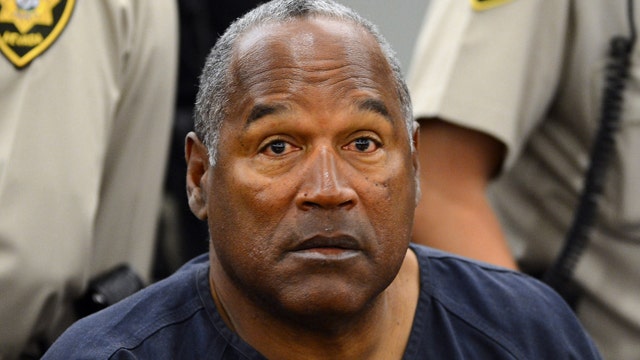His leg shackles rattling as he shuffled to and from the witness stand, O.J. Simpson made his own case Wednesday for a new trial on armed robbery charges with testimony that he relied on the advice of his trusted attorney when he tried to reclaim mementos from his football glory days.
"It was my stuff. I followed what I thought was the law," the 65-year-old former NFL star and actor said. "My lawyer told me I couldn't break into a guy's room. I didn't break into anybody's room. I didn't try to muscle the guys. The guys had my stuff, even though they claimed they didn't steal it."
Simpson said he took the advice of his longtime former lawyer, Yale Galanter, and didn't testify in his Las Vegas trial at which he was convicted in 2008 of armed robbery, kidnapping and other charges and sentenced to nine to 33 years in prison.
His fall from long-ago fame and fortune was on display as a grayer, bulkier Simpson made his way through the courtroom. The Heisman Trophy college running back and NFL record-setter once made TV commercials running through airports. As Nevada prison inmate No. 1027820, he's been handcuffed and chained at the ankles during a hearing on his claim that he was poorly represented by his attorney during the trial.
His physician, Henry Johnson, watched and said Simpson appeared to be in good health.
H. Leon Simon, attorney for the state, conducted a brief cross-examination that focused on some of the same details Simpson attorney Patricia Palm raised about advice Simpson received from his trial lawyers, Galanter and co-counsel Gabriel Grasso.
"Mr. Galanter advised me not to testify," Simpson reiterated.
"You made a decision to follow Mr. Galanter's advice, rather than Mr. Grasso's, and not testify?" Simon asked.
"Yes," Simpson said.
Simpson did acknowledge that he didn't have a legal right to take some things from the Palace Station hotel room where he and five men confronted two sports memorabilia dealers -- including baseballs signed by Pete Rose and Duke Snyder and lithographs of football great Joe Montana. Simpson said he thought those items would be returned later. He said he didn't remember taking a hat from one of the dealers.
Earlier, under detailed questioning by Palm, Simpson seemed to describe every minute of a weekend that began with plans for a friend's wedding and ended with him under arrest.
He said he knew the memorabilia dealers, had no fear of them and certainly didn't need guns.
"There was no talk of guns at all," he said. Simpson declared he never even saw guns during the confrontation.
During the trial, two former co-defendants who testified for the prosecution said they had guns.
Simpson's bid for freedom hinges on showing that Galanter had conflicted interests and gave him bad trial and appellate advice.
Galanter, of Miami, is due to testify Friday. He has declined comment ahead of that appearance.
"He was my guy," Simpson said of his long friendship and professional relationship with Galanter.
He said Galanter told him he was within his legal rights to take back possessions as long as there was no violence or trespassing.
Grasso has said it was Galanter who convinced Simpson not to testify.
While the trial prosecutor testified earlier that there were preliminary discussions with Galanter about a plea bargain, Simpson testified he was never told a bargain was under consideration and that he did not remember any offer being given to him at trial.
Asked by Palm if he knew he could have gotten as little as 30 months in prison if he pleaded guilty to robbery, Simpson said no, and that he would have considered it if he had known.
Simpson also said Galanter led him to believe he could not be convicted on the charges.
"If you understood you could be convicted on the state's evidence, would you have testified?" Palm asked.
Simpson said yes.
Dressed in a drab blue prison uniform, Simpson spoke clearly as he recounted events leading to the hotel room where the dealers had the memorabilia. His voice cracked a bit as he told of recognizing items on the bed, including framed photos that used to hang on the wall of his Los Angeles home.
"Look at this stuff. Some of the stuff I didn't really realize was gone. These were things I hadn't seen in 10 years," he said. "You know, you get a little emotional about it."
There is no jury in the hearing and Simpson's fate will be determined by District Judge Linda Marie Bell. It remained unclear Wednesday whether the judge plans to make an immediate ruling or issue a written order later.
While Simpson's previous court cases were media events, including his 1995 acquittal in the Los Angeles killings of his ex-wife and her friend, there were empty seats in the Las Vegas courtroom for the first two days of the hearing.
But on Wednesday, the courtroom was full, with Simpson family members and friends in the second row. A marshal turned people away, sending them to an overflow room where video was streamed live.
Still, the scene was much tamer than in the past.
"This is less hoopla than I expected. It's real toned down," said Wyatt Skaggs, a retired defense attorney visiting from Laramie, Wyo.


